News
Mobile connectivity a lifeline for refugees, report finds

New study by UNHCR and Accenture finds mobile phone and internet access is as critical to refugees’ safety and security as food, shelter and water.
As well as being essential for keeping in touch with loved ones, many refugees view access to a mobile phone and the internet as being as critical to their safety and security as food, water and shelter, according to a new report by UNHCR and Accenture.
The report “Connected Refugees: How the Internet and Mobile Connectivity Can Improve Refugee Well-being and Transform Humanitarian Action” is based on research undertaken in 44 countries on four continents. It shows that for many refugees a connected device is a lifeline and a critical tool for self-empowerment.
The study finds that while affordability is often a barrier to connectivity, refugees living in urban areas tend to have similar access to mobile networks as other urban populations. But for refugees in rural locations the picture is very different, with only one in six located in areas with 3G access, and one in five having no mobile coverage at all – significantly lower than for the population at large.
“In the world we live in today, internet connectivity and smart phones can become a lifeline for refugees, providing an essential means for them to give and receive vital information, communicate with separated family members, gain access to essential services, and reconnect to the local, national and global communities around them,” said Filippo Grandi, the United Nations High Commissioner for Refugees.
“Most importantly, connectivity can help broaden the opportunities for refugees to improve their own lives and pursue a vision of a future that would otherwise be denied to them,” he added.
The findings come at a moment when wars and persecution have driven more people from their homes than at any time since UNHCR, the UN Refugee Agency, began keeping records. At end of 2015, 65.3 million people were displaced worldwide, of whom 21.3 million were refugees.
Faced with a pressing need, the study recommends additional investments in three main areas, which together form the basis of a new UNHCR Global Strategy for Connectivity for Refugees. These include increasing the availability of mobile networks, improving affordability, and providing access to training, digital content and services.
The report also identifies a number of strategic interventions to help ensure connectivity, ranging from partnering with Mobile Network Operators and other technology and communications companies to improve infrastructure, making targeted investments in infrastructure, and enabling an environment and system for digital service delivery.
“Especially critical to this effort will be the engagement of the private sector, especially technology companies and mobile network operators. Accenture is particularly optimistic about the potential for UNHCR and the humanitarian community to work together with the private sector to improve the well-being and humanitarian support of displaced people through enhanced connectivity,” said Dan London, group chief executive of Accenture’s Health and Public Service business.
Accenture is a leading global professional services company, providing a broad range of services and solutions in strategy, consulting, digital, technology and operations.
Drawing on the business model of the Accenture Development Partnership (ADP), the report also identifies ways to engage the private sector to solve the connectivity challenge, leveraging creative partnerships and smart investments. ADP harnesses the global capabilities and experience of Accenture to impact positively the lives of people in the developing world.
“Private-sector partnerships are essential to scale the connectivity interventions globally,” said Roger Ford, ADP managing director. “Companies and corporations bring global reach, innovative business models, experience in the communications and telecommunications industries, relationships with government regulators and financial and human resources, all of which will be instrumental to connecting the world’s refugee population.”
Refugees and Connectivity: An Introduction
Over the last 25 years, the internet and mobile communications have transformed life in the industrialized and developing worlds alike. Now that so much information is readily available, we worry about overload more than scarcity. Mobile communications and social media provide abundant ways to stay in touch with friends, family and colleagues. Cloud computing, remote working and networked global teams are re-shaping the ways we interact and connect.
Not so for the world’s refugees. Today, more than 65 million people – the largest number since the Second World War – are living as refugees or are internally displaced, uprooted from their homes in search of safety, and often struggling to access the basic means of survival.
But displaced people are also living without the connectivity they need to obtain vital information, communicate with loved ones, access basic services and link to the local, national and global communities around them.
The places where they live frequently lack digital networks and infrastructure, or the connectivity available there is too expensive. The digital revolution transforming the world is leaving refugees behind.
The Need for Connectivity
UNHCR carried out a global assessment of refugees’ access to, and use of, the internet and mobile phones where available, to help inform the development of a new UNHCR Global Strategy for Connectivity for Refugees.
Refugees vs. Global Population: Mobile Network Coverage
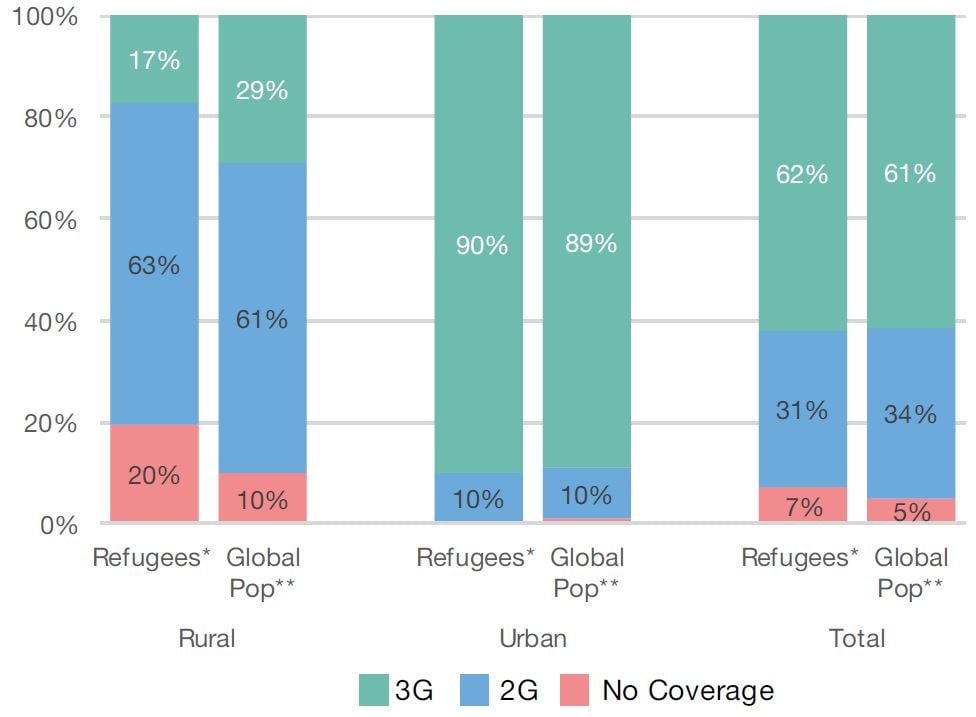
Key findings
One of the key findings of the research is that while 7 per cent of refugee communities lack the requisite digital infrastructure for internet access and mobile communications, most refugees in urban areas live in places that have 2G or 3G mobile coverage. For those in rural areas, however, the situation is far worse, with 20 per cent living in areas with no connectivity.
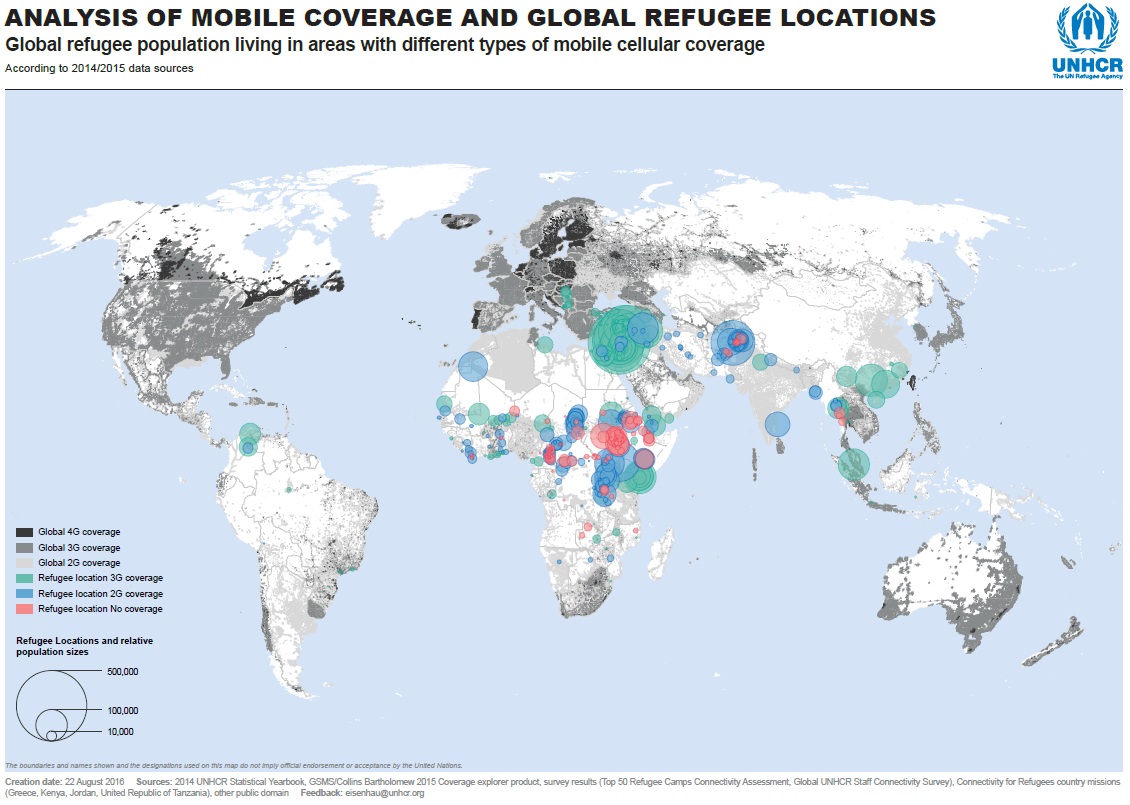
Cost
Our assessment also found that refugees often spend up to a third of their disposable income on staying connected – highlighting the main obstacle to refugee connectivity: cost. Globally, refugees are 50 per cent less likely than the general population to have an internet-enabled phone, and 29 per cent of refugee households have no phone at all.
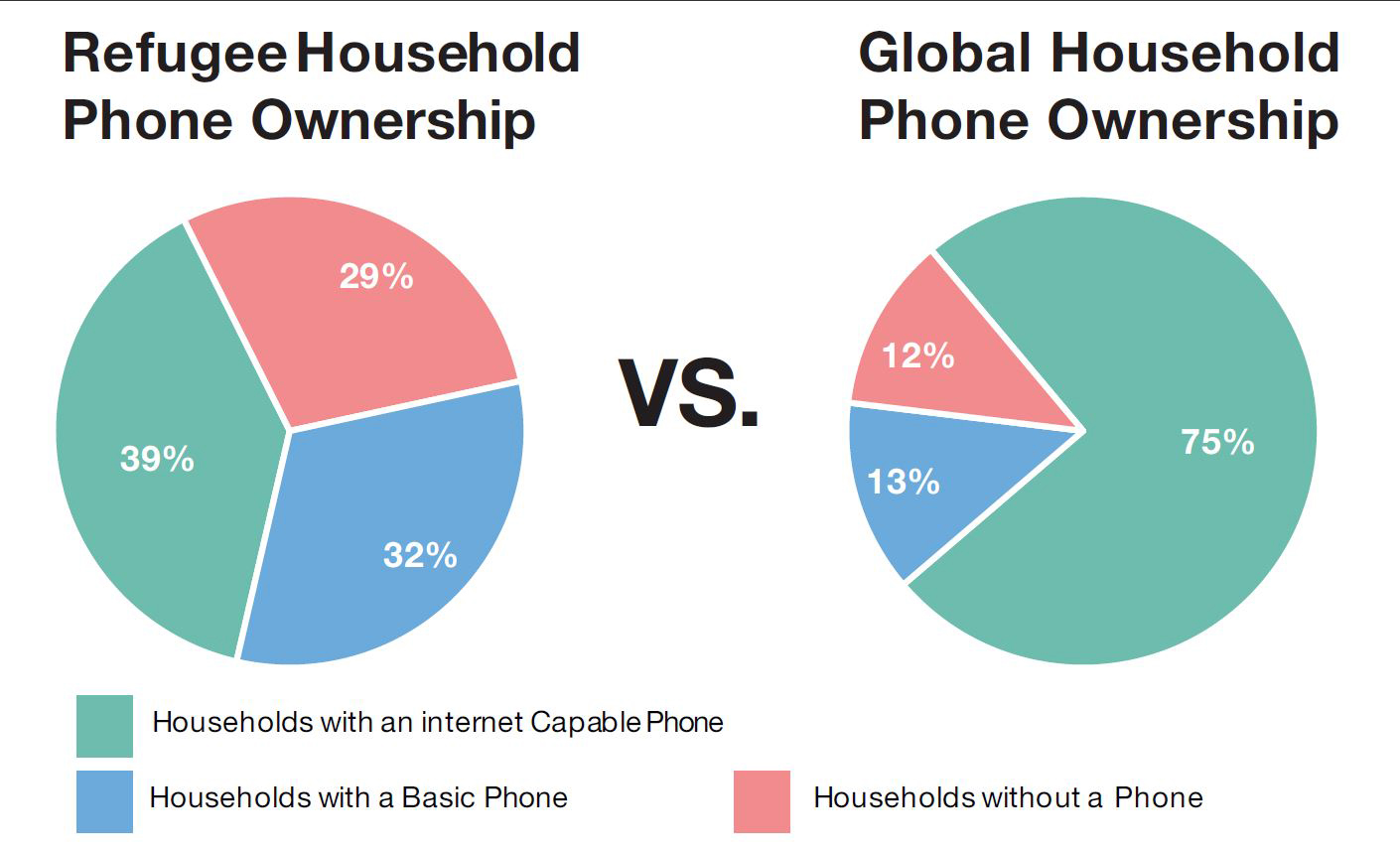
The need for communication
In all discussions between refugees and UNHCR staff, communication with friends and family was identified as the most important need from connectivity. Arguably, this need is greater for refugees than for the general population because displacement often separates refugees from their loved ones and can leave them isolated. Knowing where friends and family are and knowing that they are safe is of paramount importance to refugees.
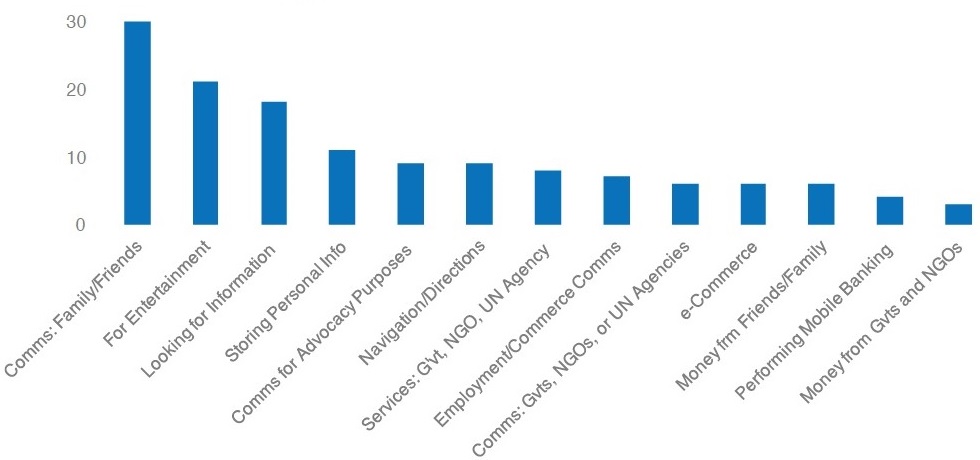
Benefits of Connectivity
Living unconnected means making contact and sustaining communication with loved ones is difficult and often impossible. Without access to up-to-date information on the situation back in their home countries and in their countries of asylum, refugees cannot make informed choices about how to improve their lives, or access basic services for health and education.
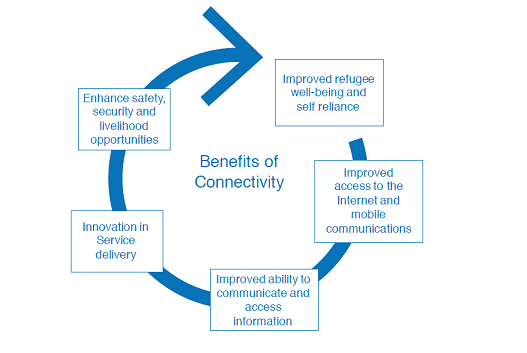
Lack of connectivity constrains the capacity of refugee communities to organize and empower themselves, thus limiting potential for self-reliance and livelihoods.
A connected refugee population can play a critical role in enabling organizations such as UNHCR to innovate effectively and to improve the quality of services that we provide. Connectivity has the potential to transform how we communicate, the way we respond to the protection needs of displaced people, and our delivery of humanitarian services. Most significantly, better connectivity can promote self-reliance by broadening the opportunities for refugees to improve their own lives. Access to the internet and mobile telephone services has the potential to create a powerful multiplier effect, boosting the well-being of refugees and of the communities that host them.




